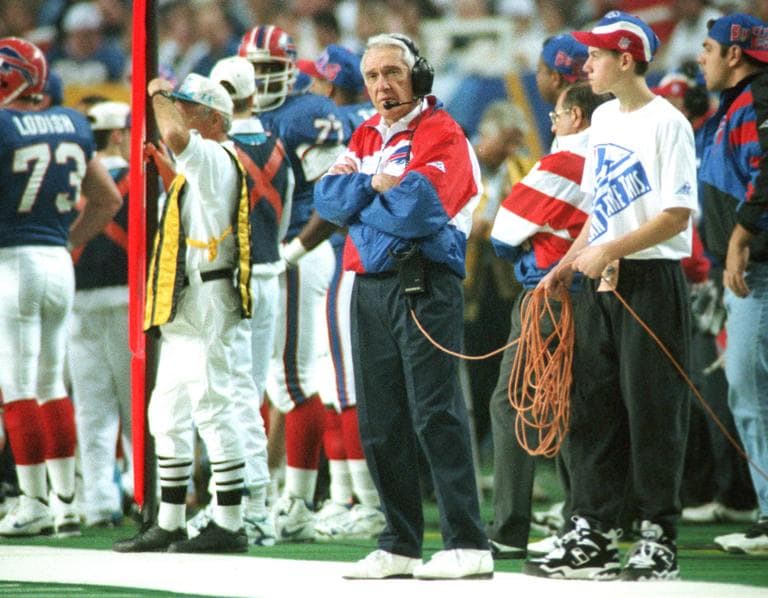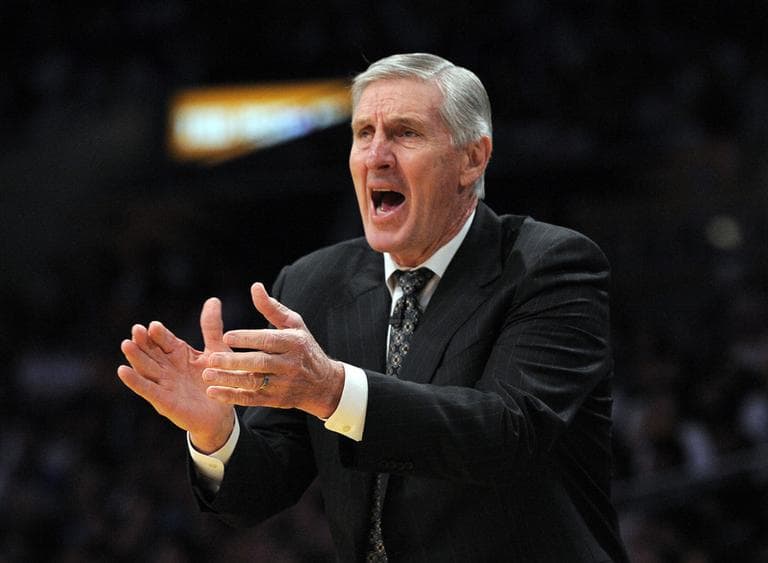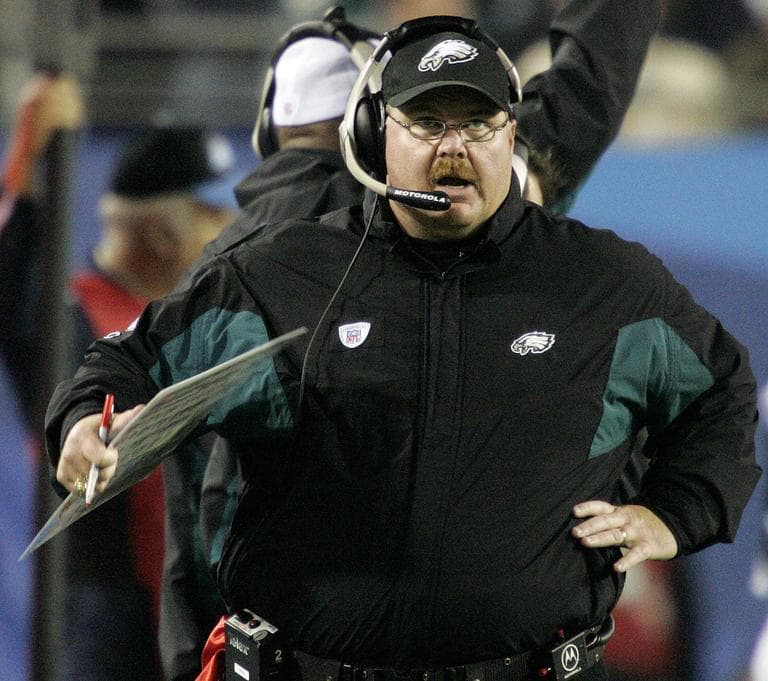Advertisement
Can Pro Coaches Succeed Without Championships?

In pro sports, coaches often keep one eye on the field and the other on the employment line. Even those who win a championship can wind up looking for a job after a few losing seasons.
Still, a handful manage to stay in one place just by coming close.
Success can take many forms. Recently, Charlie Sheen has been summing it up this way: “Winning.”
Lauren Mackler has a more nuanced definition. Mackler is a coach and psychotherapist who helps people achieve personal and professional goals and is the author of "Solemate: Master the Art of Aloneness and Transform Your Life."
“Well, it’s subjective, right? So it’s defined and it’s experienced by people in a lot of different ways," Mackler said. "Some people’s success might mean they have a certain amount of money or they have a certain amount of prestige. They might have a large circle of friends, fulfilling personal life, fulfilling career, a rewarding career. So it’s different for different people.”

That sounds reasonable, but sports are not reasonable. And the ultimate definition of success for coaches in major pro sports is predetermined: championships. Win them and you’ll always have a place in history. Don’t, and you’ll likely be forgotten — or worse — you’ll be remembered for failing to win.
ESPN.com columnist Bill Simmons is perplexed by teams who hire coaches who’ve repeatedly struggled in the past.
“I would never hire somebody who’s failed twice. I might hire somebody who failed once. You learn from your mistakes the first time around,” Simmons said between panels at MIT’s Sloan Sports Analytics Conference in Boston last month. “I don’t understand how these guys — like their third, fourth time — why anybody would hire them. Teams are scared a lot of the time. They’re always going to gravitate to the safest option over taking a chance.”
That fear of the unknown has created a job market for coaches that’s like a game of musical chairs, played inside a revolving door on top of a merry-go-round that rarely lets people on … or off.
Advertisement
Championships stop the spinning, at least temporarily, but near-misses can be even more powerful.
Buffalo Bills head coach Marv Levy came up short in four straight Super Bowls in the early 1990s. Buffalo fans remained loyal to Levy and have done the same with long-time Sabres coach Lindy Ruff, according Bob Matthews, a sports columnist for the Rochester Democrat and Chronicle.
“There’s never been a big public outcry to replace him," Matthews said. "It’s been sporadic and that’s because the team is never down for long. I think he gets the most out of what he has and I don’t think to this point he’s ever had the most.”
Ruff took over as Sabres head coach in 1997. The next season, the Sabres went to the NHL’s Stanley Cup Finals, but haven’t been back since. Matthews says 10 winning records in the last 12 seasons and deep roots in Buffalo ensure Ruff’s job is safe, but it might be different in a bigger city.
"Teams are scared a lot of the time. They’re always going to gravitate to the safest option over taking a chance."
Bill Simmons, ESPN.com
“He’d probably be gone by now, because the fans do have less patience,” Matthews said. “Management has less patience and it’s just easier to get rid of guys in a major market. But here, he’s part of the community.”
Jerry Sloan retired earlier this season after 23 years on the bench for the Utah Jazz. Sloan led the Jazz to consecutive NBA Finals appearances in 1997 and 1998. It was as close as Sloan would ever get to a title, but Bill Simmons believes the Jazz were right to stick with him.
“I thought Sloan was a great coach. A lot of this is luck," Simmons said. “Phil Jackson got to coach Michael Jordan and Kobe Bryant and he’s had loaded teams for the last 20 years. He’s a really good coach, but he also coached that Lakers team two years after Shaq left that went 42-40. He wasn’t that good of a coach that year. Your talent’s going to determine how you do.”
There’s no question Sloan was a regular season success. He’s third on the NBA’s all-time wins list. But did he last so long because small-market sports spotlights have a lower wattage? Maybe, but Philadelphia Eagles head coach Andy Reid is still employed after 12 years on the job without a title.
Michael Bradley is an online columnist for Philadelphia Magazine and a contributor to the Sporting News and Athlon Sports. Our conversation began with a simple question: Andy Reid, winner or loser?
“He has to be considered a winner," Bradley replied. "His longevity in Philadelphia would demonstrate that. His success to a point — five NFC championship game appearances, one Super Bowl appearance, several division titles, a consistent run to the postseason. It may not be the ultimate winner, but he is certainly a winner.”
Bradley says there’s another measure of success for consistent coaches like Reid and Jeff Fisher, who left the Tennessee Titans after 16-plus seasons and one losing trip to the Super Bowl.

“When you fill the seats with a waiting list, when you’re getting home playoff games for your owner, when you are helping the team sell merchandise, you get success so that a new stadium is built,” Bradley said. “All this jacks up the value of the franchise.”
Bradley says more Philly fans are starting to turn against Reid, but change isn’t always the answer. In 2006 San Diego had its best regular season ever, made the playoffs, and fired head coach Marty Schottenheimer after the season. The results under his replacement Norv Turner have been similar: lots of regular season wins and playoff disappointments.
Lifelong Chargers fan Cameron Schleicher says he’s seen plenty of losing seasons, so he’s grateful for the last several years, but he’s in the minority.
“Speaking for most fans, I would say it’s been too long. They forget,” the 37-year-old San Diego resident said. “They just want to gut the team and start over and see what happens from there.”
The dividing line between coaching icons and infamous also-rans might be Bobby Cox. Cox spent 29 seasons as a Major League Baseball manager. His second stint with the Braves started in 1990 and when he retired after last season he was praised as one of baseball’s greatest managers.
Cox got Atlanta to the World Series five times, but won just once, in 1995. Atlanta resident and Braves fan Jerry Matheny says it was disappointing to only get one World Series trophy out of the Braves’ 14 division crowns under Cox, but he never wanted another manager.
“I would stick with Bobby because he’s the one that got us to the big games to begin with,” Matheny said. “If he hadn’t been in there finding players and playing the percentages and being a solid decision maker day-in and day-out, we wouldn’t have been there to begin with.”
Since he was glad to see one World Series victory under Cox, was Matheny surprised in 2007 when the Yankees let contract negotiations get in the way of re-signing Joe Torre, who’d led New York to four titles?
“Well, I don’t know. Atlanta said goodbye to Torre,” Matheny replied, laughing.
And, so we’ve reached the musical chairs/revolving door/merry-go-round again. Matheny’s right. The Braves did say goodbye to manager Joe Torre, firing him after the 1984 season. But who did Torre replace? Well, that would be Bobby Cox, who Atlanta fired in 1981.
All of these close calls can be tough on loyal fans. But success coach Lauren Mackler says fans who are completely enraged by a coach’s failures tend to have their own shortcomings.
“They project a lot of their own stuff," Mackler said. "Their own failures, their own frustrations about holding themselves back and really going for it in their own lives. And if you can beat up somebody who’s fallen short, you get to feel better about yourself.”
In the end, maybe championship-starved coaches should take a cue from Marlon Brando’s Terry Malloy, who famously declared in "On the Waterfront": “I coulda been a contender. I coulda been somebody.”
After all, they’ve already gotten what Malloy wanted: a shot at the title and a little name recognition.
This segment aired on April 9, 2011.
